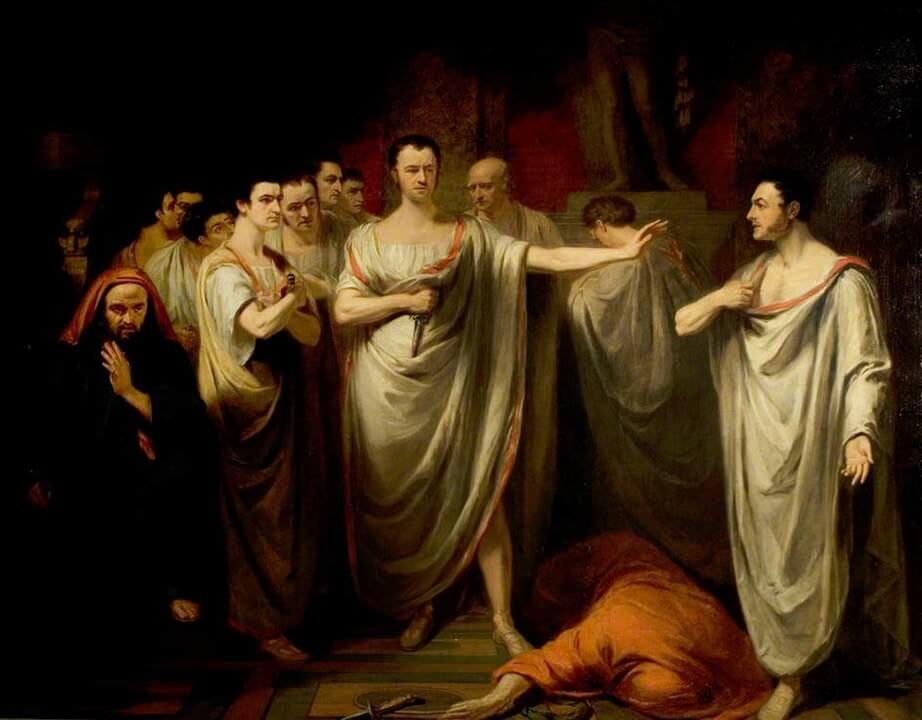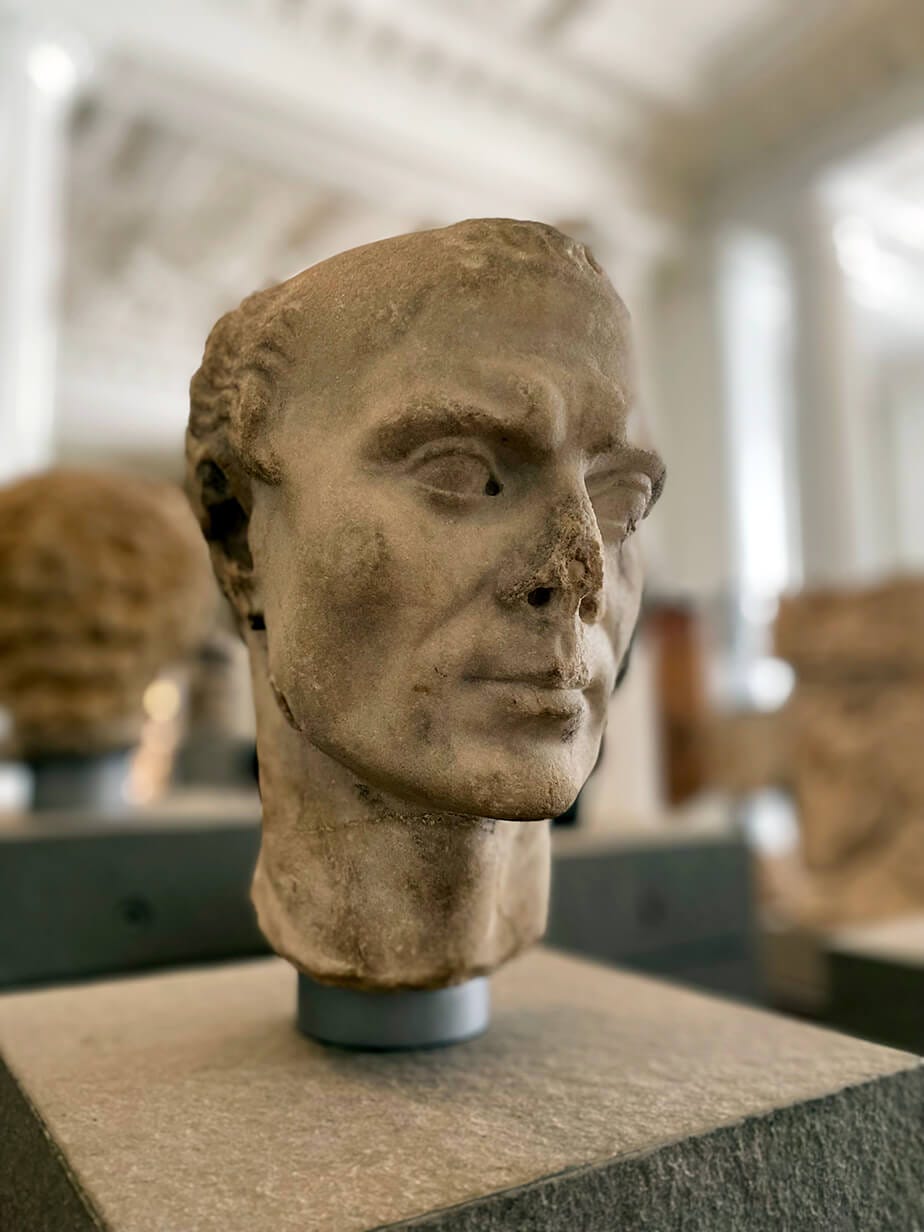
There’s a distinct whiff of testosterone in Shakespeare’s Julius Caesar. Rome is a city of machismo, where men battle it out, where the defeated fall on their swords and where leaders jump into the “angry flood” of the Tiber to race their subjects.
Rome’s women are either side-lined or ignored. Portia wounds herself in the thigh just to get Brutus’s attention, and her suicide (reported briefly in Act 4) is there simply to test her Stoic husband to the limits of his endurance. Calphurnia – correct about the danger her husband, Caesar, faces if he visits the Capitol – is dismissed as fanciful.
But this is not really a play about toxic masculinity any more than it’s a play that offers good political choices over bad ones. All the protagonists have distinct motivations, and it’s these (or, rather, their characters) that drive the action forward. A central theme - as with Macbeth - is whether people control their own destinies or are subject to fate. What Shakespeare believed is debateable, but his characters represent different approaches to this central question.
Being an Epicurean, Cassius laughs in the face of soothsaying and omens; in Act 1, Scene 3, we see him rushing into a storm with his clothing loose (“And, thus, unbraced, Casca, as you see, [I] Have bar’d my bosom to the thunder-stone”). In Act 1, Scene 2, Caesar famously ignores the soothsayer’s advice (“Beware the ides of March”), but his reason is arrogance rather than any philosophical objections. Mark Antony, on the other hand, reacts to the news that Octavius is in Rome with: “Fortune is merry, and in this mood will give us any thing” (Act 3, Scene 3).
When I recently re-read my student text, my first reaction was that it’s essentially a group biography (the last time I read the play, incidentally, was 30 years ago). I dismissed this idea at first, but a consideration of Shakespeare’s sources encouraged me to return to it. Shakespeare drew on Thomas North’s 1579 translation of Plutarch’s Lives, and, as the introduction to my Arden 2nd edition of the play (edited by T. S. Dorsch) explains, he condensed these comparatively leisurely narratives into “a single closely knit and swiftly moving drama which has been aptly called ‘a political thriller’” (p. xvii).
As a biographer myself, I was clearly responding to the complexity of Shakespeare’s task and the apparent ease by which he achieves it. One of the frequent complaints about Julius Caesar is that the title character dies halfway through the play, but for me, its brilliance lies in the characterisation of the group: Caesar, Cassius, Brutus and Antony. Caesar is important, but he is too monumental to be the sole focus (and, in a sense, he lives on after his death, appearing as a ghost on the plains of Philippi in Act 4). In representing the struggles of these four men, Shakespeare is using biography to test the hypothesis that character, not fate, is the driving force of our lives.
The destinies of Shakespeare’s protagonists all spring from the strengths and flaws in their characters. Brutus and Cassius die exactly as they live. Brutus falls on his sword, enshrining the ideas of honour that have characterised his existence; Antony calls him, correctly, “the noblest Roman of them all”, being the only conspirator to be motivated by Rome and not by envy of Caesar (Act 5, Scene 5). Meanwhile, Cassius commits suicide having mistaken the appearance of Antony’s troops as a sign of Brutus’s defeat (“O, look, Titinius, look, the villains fly” he says in Act 5, Scene 3 – of his own men). He is suspicious and pessimistic. In dying, he weakens Brutus, and so the defeat he fears becomes a self-fulfilling prophecy.
There is much more to say about this play’s take on leadership and the place of tenderness in a militarised society, but I wanted to focus, for now, on a biographical reading of Julius Caesar. As Harold Bloom asserted in Shakespeare: The Invention of the Human:
Shakespeare’s stance towards Brutus, Cassius, and Caesar himself is very difficult to interpret, but that is one of the strengths of this admirable play.
As humans, we want certainty, but biography teaches us that people are rarely one thing. Is Caesar a strong leader or a tyrant? That depends entirely on your perspective.






Leader or Tyrant?
"Here's the coin; in tossing it I'm calling both, heads and tails; sure to be a winner!"
Long before Schrodinger conceived of his Cat, Roman's had conceived of Janus and as I write this very Sunday Syrian's can conceive of a future horizon brighter than the bleakness of the past 54 years.
How you interpret Schrodinger's Cat, Janus's Two Faces or the al-Assad Regime is, exactly as you suggest, dependent on personal perspective.
I think, in tossing the same coin as second time my call would be different; in fact, thinking on having formed a firm view, I wouldn't toss the coin. Schrodinger, Janus and Bashar-al-Assad are each figures from history whose attitudes and actions were shaped by who they were, their own characters and not by some external hand of fate.
History is a long running river, our human understanding of which is based on the best stories we have yet been able to tell ourselves about it. Your fresh prosecution of the case for reading 'Julius Caesar' as a group biography has been compelling and won me over.
If the play's the thing, what manner of thing be this play?
Thanks for another grey-cell stimulating Sunday post.